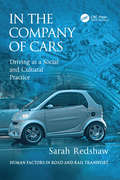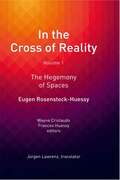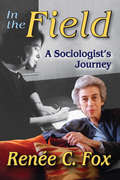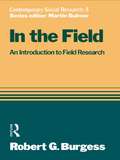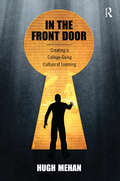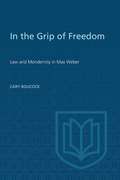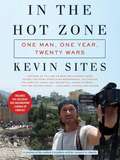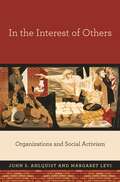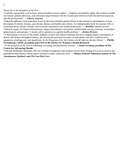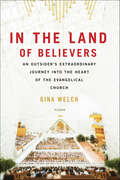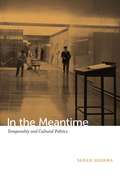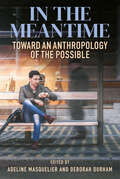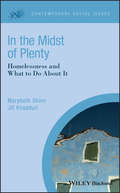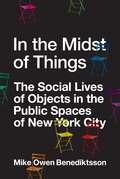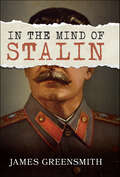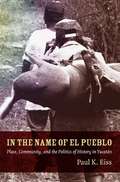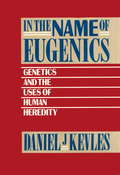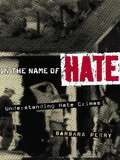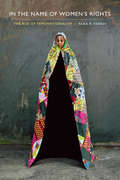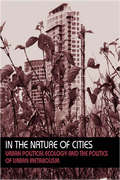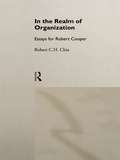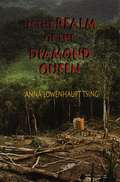- Table View
- List View
In the Company of Cars: Driving as a Social and Cultural Practice (Human Factors in Road and Rail Transport)
by Sarah RedshawIt has long been accepted that the social and cultural meanings of the car far exceed the practical need for mobility. This book marks the first attempt to contribute to road safety, considering, in depth, these meanings and the cultures of driving that are shaped by them. In the Company of Cars examines the perspectives that young people have on cars, and explores the broader social and cultural meanings of the car, the potential it is supposed to fulfil, and the anticipated benefits it offers to young drivers. From focus-group research conducted in Australia, the book takes up the views of young people on a range of topics, from media to car use to gender performance. The author looks at the ways in which driving has been defined by articulations of the car that emphasize valued features of the car-driver, such as gender, youthfulness, status, age, power, raciness, sexiness, ruggedness and competitiveness. The book takes a global perspective on mobility, considering the impact of cars and road safety policy on quality of life, and the value and significance of other modes of travel, in a range of countries.
In the Cross of Reality: The Hegemony of Spaces
by Eugen Rosenstock-HuessyThis book makes the first volume of Eugen Rosenstock-Huessy’s Soziologie available in English for the first time since its 1956 publication in German. Rosenstock-Huessy argues that social philosophy has favored abstract and spatially contrived categories of social organization over temporal processes. This preference for space-thinking has diverted us from recognizing the power of speech and its relationship to living on the front lines of life. Taking speech and the social responsibilities and reciprocities that accompany naming as the key to social reality, In the Cross of Reality provides a sociological exploration of “play” spaces as the basis for reflexivity. It also explores the spaces of activity and their correlation in war and peace to the spheres of “serious life.” If we are to survive and flourish, different qualities and reciprocal relationships must be cultivated so that we can deal with different fronts of life. Arguing that modern intellectuals and their obsession with space have created a dangerously false choice between mechanical and aesthetic salvation, Rosenstock-Huessy clears a path so that we better appreciate our relationship between past and future in founding and in partitioning time.
In the Field: A Sociologist's Journey
by Renée C. FoxIn the Field, by Renee C. Fox, is a narrative account of the author's life as a sociologist. It is not a memoir in the conventional sense; rather, it is an ethnographic autobiography. Drawing on a vast reservoir of notes and documents that chronicle the span of her career, this work also focuses on the places Fox's field research has carried her.Propelled by a conviction to move beyond the boundaries of herself and of her native land, Fox has done first-hand research in Europe, Central Africa, and China, as well as in the United States. The majority of her research has centered on health, illness, and medicine. Other recurrent themes that pervade her work include training for uncertainty; the allocation of scarce resources; the relationship between self and others; detachment and concern; the particular and the universal; the harm that can result from intended good; and the questions posed by illness and accident, pain and suffering, and death.It is Fox's commitment as a teacher and mentor of generations of students that lies at the heart of this book. This volume will inspire new generations of social researchers.
In the Field: An Introduction to Field Research (Social Research Today Ser.)
by Robert G. BurgessFirst Published in 2004. Routledge is an imprint of Taylor & Francis, an informa company.
In the Front Door: Creating a College-Going Culture of Learning
by Hugh MehanThis book provides a critical analysis of the origins, nature, development, and transformation of the state and society historically and today, examining the class nature and social basis of politics and the state in different societal settings. The book emphasizes the centrality of class relations in explaining political power and the role of the state in class-divided societies by providing powerful theoretical and empirical analyses of themes in political sociology in an era of globalization. It examines in detail the major political issues and events of our time, and makes them relevant to the study of power and politics today. Students from many ethnic minority backgrounds and low-income families are underrepresented in American colleges and universities. This book describes and assesses educational policies and practices that seek to rectify this important manifestation of structured inequality. Inspired by a commitment to providing a pathway to college and beyond, Mehan and his team document the innovate practices developed and implemented at the nationally recognized schools created by The Center for Research in Educational Equity, Access, and Teaching Excellence (CREATE) at the University of California-San Diego: the Preuss School, a 6-12 charter school on the UCSD campus for underrepresented minority students; and nearby schools located in economically depressed neighborhoods. Based on long-term research, Mehan's book makes important contributions to the literature on educational achievement disparities that exist-and are growing-within the United States. He sheds light on how we can improve public policy for the futures of secondary school students.
In the Grip of Freedom: Law and Modernity in Max Weber (The Royal Society of Canada Special Publications)
by Cary BoucockFaith in the utility and value of legal rights forms the political common sense of our age. With its profound breadth and insight into the modern condition, Max Weber's social and political thought is widely considered to be the most influential of the era. Legal phenomena play a centre-stage role in his account of the development of the West and the rationalism of modern social arrangements.Cary Boucock's "In the Grip of Freedom" examines the relationship between Max Weber's "Sociology of Law" and his interpretation of the structure and meaning of modern society. Weber's social and political thought is investigated in the context of developments in Canada which have followed the 1982 enactment of the Canadian Charter of Rights and Freedoms-namely, the movement toward a rights-oriented nation where broad social issues are routed through the courts, and the political self-understanding of the citizen becomes increasingly tied to a conception of the individual as a rights-bearing subject. Professor Boucock's text runs against the grain of conventional assessments of Weber's legal theory and its applicability to understanding contemporary legal developments. He explores the significance of Weber's sociology of law theories within the larger compass of his sociological thought and illustrates the significance of Weber's sociology for interpreting the social dimensions of present-day legal developments in Canada. Weber's work is a vehicle for understanding the social and legal practices of our own time, and thus, goes far beyond a simple interpretation of the great German thinker.
In the Hands of God: How Evangelical Belonging Transforms Migrant Experience in the United States
by Johanna Bard RichlinHow evangelical churches in the United States convert migrant distress into positive religious devotionWhy do migrants become more deeply evangelical in the United States and how does this religious identity alter their self-understanding? In the Hands of God examines this question through a unique lens, foregrounding the ways that churches transform what migrants feel. Drawing from her extensive fieldwork among Brazilian migrants in the Washington, DC, area, Johanna Bard Richlin shows that affective experience is key to comprehending migrants’ turn toward intense religiosity, and their resulting evangelical commitment.The conditions of migrant life—family separation, geographic isolation, legal precariousness, workplace vulnerability, and deep uncertainty about the future—shape specific affective maladies, including loneliness, despair, and feeling stuck. These feelings in turn trigger novel religious yearnings. Evangelical churches deliberately and deftly articulate, manage, and reinterpret migrant distress through affective therapeutics, the strategic “healing” of migrants’ psychological pain. Richlin offers insights into the affective dimensions of migration, the strategies pursued by evangelical churches to attract migrants, and the ways in which evangelical belonging enables migrants to feel better, emboldening them to improve their lives.Looking at the ways evangelical churches help migrants navigate negative emotions, In the Hands of God sheds light on the versatility and durability of evangelical Christianity.
In the Hot Zone
by Kevin SitesKevin Sites is a man on a mission. Venturing alone into the dark heart of war, armed with just a video camera, a digital camera, a laptop, and a satellite modem, the award-winning journalist covered virtually every major global hot spot as the first Internet correspondent for Yahoo! News. Beginning his journey with the anarchic chaos of Somalia in September 2005 and ending with the Israeli-Hezbollah war in the summer of 2006, Sites talks with rebels and government troops, child soldiers and child brides, and features the people on every side, including those caught in the cross fire. His honest reporting helps destroy the myths of war by putting a human face on war's inhumanity. Personally, Sites will come to discover that the greatest danger he faces may not be from bombs and bullets, but from the unsettling power of the truth.
In the Interest of Others: Organizations and Social Activism
by Margaret Levi John S. AhlquistA groundbreaking study of labor unions that advances a new theory of organizational leadership and governanceIn the Interest of Others develops a new theory of organizational leadership and governance to explain why some organizations expand their scope of action in ways that do not benefit their members directly. John Ahlquist and Margaret Levi document eighty years of such activism by the International Longshore and Warehouse Union in the United States and the Waterside Workers Federation in Australia. They systematically compare the ILWU and WWF to the Teamsters and the International Longshoremen's Association, two American transport industry labor unions that actively discouraged the pursuit of political causes unrelated to their own economic interests.Drawing on a wealth of original data, Ahlquist and Levi show how activist organizations can profoundly transform the views of members about their political efficacy and the collective actions they are willing to contemplate. They find that leaders who ask for support of projects without obvious material benefits must first demonstrate their ability to deliver the goods and services members expect. These leaders must also build governance institutions that coordinate expectations about their objectives and the behavior of members.In the Interest of Others reveals how activist labor unions expand the community of fate and provoke preferences that transcend the private interests of individual members. Ahlquist and Levi then extend this logic to other membership organizations, including religious groups, political parties, and the state itself.
In the Kingdom of the Sick: A Social History of Chronic Illness in America
by Laurie EdwardsThirty years ago, Susan Sontag wrote, "Everyone who is born holds dual citizenship in the kingdom of the well and the kingdom of the sick ... Sooner or later each of us is obliged, at least for a spell, to identify ourselves as citizens of that other place." Now more than 133 million Americans live with chronic illness, accounting for nearly three-quarters of all health care dollars, and untold pain and disability. <p><p> There has been an alarming rise in illnesses that defy diagnosis through clinical tests or have no known cure. Millions of people, especially women, with illnesses such as irritable bowel syndrome, chronic pain, and chronic fatigue syndrome face skepticism from physicians and the public alike. And people with diseases as varied as cardiovascular disease, HIV, certain cancers, and type 2 diabetes have been accused of causing their preventable illnesses through their lifestyle choices. <p><p> We must balance our faith in medical technology with awareness of the limits of science, and confront our throwback beliefs that people who are sick have weaker character than those who are well. Through research and patient narratives, health writer Laurie Edwards explores patient rights, the role of social media in medical advocacy, the origins of our attitudes about chronic illness, and much more. What The Noonday Demon did for people suffering from depression, In the Kingdom of the Sick does for those who are chronically ill.
In the Land of Believers: An Outsider's Extraordinary Journey into the Heart of the Evangelical Church
by Gina WelchAn undercover exploration of the world of evangelicals, offering an extraordinary behind-the-scenes look at the faithfulEver since evangelical Christians rose to national prominence, mainstream America has tracked their every move with a nervous eye. But in spite of this vigilance, our understanding hasn't gone beyond the caricatures. Who are evangelicals, really? What are they like in private, and what do they want? Is it possible that beneath the differences in culture and language, church and party, we might share with them some common purpose?To find out, Gina Welch, a young secular Jew from Berkeley, joined Jerry Falwell's Thomas Road Baptist Church. Over the course of nearly two years, Welch immersed herself in the life and language of the devout: she learned to interpret the world like an evangelical, weathered the death of Falwell, and embarked on a mission trip to Alaska intended to save one hundred souls. Alive to the meaning behind the music and the mind behind the slogans, Welch recognized the allure of evangelicalism, even for the godless, realizing that the congregation met needs and answered questions she didn't know she had. What emerges is a riveting account of a skeptic's transformation from uninformed cynicism to compassionate understanding, and a rare view of how evangelicals see themselves. Revealing their generosity and hopefulness, as well as their prejudice and exceptionalism, In the Land of Believers is a call for comprehending, rather than dismissing, the impassioned believers who have become so central a force in American life.
In the Meantime: Temporality and Cultural Politics
by Sarah SharmaThe world is getting faster. This sentiment is proclaimed so often that it is taken for granted, rarely questioned or examined by those who celebrate the notion of an accelerated culture or by those who decry it. Sarah Sharma engages with that assumption in this sophisticated critical inquiry into the temporalities of everyday life. Sharma conducted ethnographic research among individuals whose jobs or avocations involve a persistent focus on time: taxi drivers, frequent-flyer business travelers, corporate yoga instructors, devotees of the slow-food and slow-living movements. Based on that research, she develops the concept of "power-chronography" to make visible the entangled and uneven politics of temporality. Focusing on how people's different relationships to labor configures their experience of time, she argues that both "speed-up" and "slow-down" often function as a form of biopolitical social control necessary to contemporary global capitalism.
In the Meantime: Toward an Anthropology of the Possible
by Adeline Masquelier Deborah DurhamThe “meantime” represents the gap between what is past and the unknown future. When considered as waiting, the meantime is defined as a period of suspension to be endured. By contrast, the contributors of this volume understand it as a space of “the possible” where calculation coexists with uncertainty, promises with disappointment, and imminence with deferral. Attending to the temporalities of emerging rather than settled facts, they put the stress on the temporal tactics, social commitments, material connections, dispositional orientations, and affective circuits that emerge in the meantime even in the most desperate times.
In the Meantime: Toward an Anthropology of the Possible
by Adeline Masquelier Deborah DurhamThe “meantime” represents the gap between what is past and the unknown future. When considered as waiting, the meantime is defined as a period of suspension to be endured. By contrast, the contributors of this volume understand it as a space of “the possible” where calculation coexists with uncertainty, promises with disappointment, and imminence with deferral. Attending to the temporalities of emerging rather than settled facts, they put the stress on the temporal tactics, social commitments, material connections, dispositional orientations, and affective circuits that emerge in the meantime even in the most desperate times.
In the Midst of Plenty: Homelessness and What To Do About It (Contemporary Social Issues #32)
by Marybeth Shinn Jill KhadduriForeword by Nan Roman, President and CEO of the National Alliance to End Homelessness This book explains how to end the U.S. homelessness crisis by bringing together the best scholarship on the subject and sharing solutions that both local communities and national policy-makers can apply now In the Midst of Plenty shifts our understanding of the phenomenon of homelessness away from issues of individual disability and embeds it in larger contexts of poverty, income inequality, housing affordability, and social exclusion. Homelessness experts Shinn and Khadduri provide guidance on how to end homelessness for people who experience it and how to prevent so many people from reaching the point where they have no alternative to sleeping on the street or in emergency shelters. The book is organized around four questions: Who becomes homeless? Why do people become homeless? How do we end homelessness? How do we prevent it? Based on a comprehensive look at relevant research, the authors show that we know how to end homelessness—if we devote the necessary resources to doing so. In the Midst of Plenty: Homelessness and What to Do About It is an excellent resource for professionals and decision-makers in the homeless services system, as well as for anyone who is interested in helping to end homelessness. It also can be used as a text in undergraduate or masters courses in public policy, sociology, psychology, social work, urban studies, or housing policy. “The knowledgeable and thoughtful authors of this book—two brilliant women who know as much as anyone in the country about the nature of homelessness and its solutions—have done a great service by taking us on a journey through the history of homelessness, how our responses have changed, and how we can end it.” Nan Roman, President and CEO National Alliance to End Homelessness. “Shinn and Khadduri’s new book is a thorough yet concise examination of what we know about the nature and causes of homelessness, and the crucial lessons learned. This critically important work provides a roadmap to restoring basic housing and income security as viable policy options, in the face of our daunting inequality divide that otherwise threatens millions with destitution and homelessness.” Dennis Culhane, Dana and Andrew Stone Professor of Social Policy, University of Pennsylvania “Marybeth Shinn and Jill Khadduri have combined their significant expertise to create an essential guide about the history of modern homelessness and to offer a clear path forward to end this American tragedy. Their policy recommendations on ending homelessness are culled from the best about what we know works.” Barbara Poppe, Executive Director US Interagency Council on Homeless, 2009-2014.
In the Midst of Things: The Social Lives of Objects in the Public Spaces of New York City
by Mike Owen BenediktssonHow ordinary urban objects influence our behavior, exacerbate inequality, and encourage social changeAssumptions about human behavior lie hidden in plain sight all around us, programmed into the design and regulation of the material objects we encounter on a daily basis. In the Midst of Things takes an in-depth look at the social lives of five objects commonly found in the public spaces of New York City and its suburbs, revealing how our interactions with such material things are our primary point of contact with the social, political, and economic forces that shape city life.Drawing on groundbreaking fieldwork and a wealth of original interviews, Mike Owen Benediktsson shows how we are in the midst of things whose profound social role often goes overlooked. A newly built lawn on the Brooklyn waterfront reflects an increasingly common trade-off between the marketplace and the public good. A cement wall on a New Jersey highway speaks to the demise of the postwar American dream. A metal folding chair on a patch of asphalt in Queens exposes the political obstacles to making the city livable. A subway door expresses the simmering conflict between the city and the desires of riders, while a newsstand bears witness to our increasingly impoverished streetscapes.In the Midst of Things demonstrates how the material realm is one of immediacy, control, inequality, and unpredictability, and how these factors frustrate the ability of designers, planners, and regulators to shape human behavior.
In the Mind of Stalin
by James GreensmithOn 1 October 1939, Winston Churchill, First Lord of the Admiralty and soon to be the UK’s wartime leader, described Russia as ‘a riddle wrapped in a mystery inside an enigma’. The same can certainly be said of Stalin. How can this paradox of a man, who on the one hand had once exhibited great tenderness and kindness to his daughter Svetlana, and on the other sent millions – including members of his own family - to their deaths, be explained? It is impossible to quantify the total number of deaths attributable to the policies of Stalin, but the ‘Excess Mortality’ (i.e., deaths over and above what would normally have been expected during the period in question) gives an approximate figure in excess of 40 million. However, this is only part of the story of the amount of misery inflicted by the Stalin regime through torture, deliberate starvation, neglect, separation from loved ones, cold and hypothermia (e.g. in the prisons of Siberia), which is unquantifiable and unimaginable. Svetlana confessed that she ‘would never undertake to “explain” what motivated all my father’s actions, simply because I do not possess the psychological genius of [Russian novelist] Dostoevsky, who knew how to “penetrate” into another man’s soul and “examine it from within”’.
In the Name of El Pueblo: Place, Community, and the Politics of History in Yucatán
by Paul K. EissThe term “el pueblo” is used throughout Latin America, referring alternately to small towns, to community, or to “the people” as a political entity. In this vivid anthropological and historical analysis of Mexico’s Yucatán peninsula, Paul K. Eiss explores the multiple meanings of el pueblo and the power of the concept to unite the diverse claims made in its name. Eiss focuses on working-class indigenous and mestizo populations, examining how those groups negotiated the meaning of el pueblo among themselves and in their interactions with outsiders, including landowners, activists, and government officials. Combining extensive archival and ethnographic research, he describes how residents of the region have laid claim to el pueblo in varied ways, as exemplified in communal narratives recorded in archival documents, in the performance of plays and religious processions, and in struggles over land, politics, and the built environment. Eiss demonstrates that while el pueblo is used throughout the hemisphere, the term is given meaning and power through the ways it is imagined and constructed in local contexts. Moreover, he reveals el pueblo to be a concept that is as historical as it is political. It is in the name of el pueblo-rather than class, race, or nation-that inhabitants of northwestern Yucatán stake their deepest claims not only to social or political rights, but over history itself.
In the Name of Eugenics: Genetics and the Uses of Human Heredity
by Daniel J. KevlesDaniel Kevles traces the study and practice of eugenics--the science of "improving" the human species by exploiting theories of heredity--from its inception in the late nineteenth century to its most recent manifestation within the field of genetic engineering. It is rich in narrative, anecdote, attention to human detail, and stories of competition among scientists who have dominated the field.
In the Name of Hate: Understanding Hate Crimes
by Barbara PerryIn The Name of Hate is the first book to offer a comprehensive theory of hate crimes, arguing for an expansion of the legal definitions that most states in the U.S. hold. Barbara Perry provides an historical understanding of hate crimes and provocatively argues that hate crimes are not an aberration of current society, but rather a by-product of a society still grappling with inequality, difference, fear, and hate.
In the Name of Sorrow and Hope
by Noa Ben Artzi-PelossofWhen the author spoke at the funeral of her grandfather Yitzhak Rabin, she touched the world's heart. She does so again, in this deeply moving memoir and plea for peace. She shares her precious memories of her grandfather, with whom she lived until the age of six and to whom she remained close for the rest of his life. She offers insights into his transformation from soldier to leader to peacemaker, his courageous determination to change the course of the Middle East conflict, and the steps he took in search of a lasting peace for future generations of Israelis. She speaks to him, and to the world. A book that is pure, passionate, and unfailingly honest -- and goes straight to the heart.
In the Name of Womens Rights: The Rise of Femonationalism
by Sara R. FarrisSara R. Farris examines the demands for women's rights from an unlikely collection of right-wing nationalist political parties, neoliberals, and some feminist theorists and policy makers. Focusing on contemporary France, Italy, and the Netherlands, Farris labels this exploitation and co-optation of feminist themes by anti-Islam and xenophobic campaigns as “femonationalism.” She shows that by characterizing Muslim males as dangerous to western societies and as oppressors of women, and by emphasizing the need to rescue Muslim and migrant women, these groups use gender equality to justify their racist rhetoric and policies. This practice also serves an economic function. Farris analyzes how neoliberal civic integration policies and feminist groups funnel Muslim and non-western migrant women into the segregating domestic and caregiving industries, all the while claiming to promote their emancipation. In the Name of Women's Rights documents the links between racism, feminism, and the ways in which non-western women are instrumentalized for a variety of political and economic purposes.
In the Nature of Cities: Urban Political Ecology and the Politics of Urban Metabolism (Questioning Cities)
by Nik Heynen Maria Kaika Eric SwyngedouwThe social and material production of urban nature has recently emerged as an important area in urban studies, human/environmental interactions and social studies. This has been prompted by the recognition that the material conditions that comprise urban environments are not independent from social, political, and economic processes, or from the cultural construction of what constitutes the ‘urban’ or the ‘natural’. Through both theoretical and empirical analysis, this groundbreaking collection offers an integrated and relational approach to untangling the interconnected processes involved in forming urban landscapes. The essays in this book attest that the re-entry of the ecological agenda into urban theory is vital both in terms of understanding contemporary urbanization processes, and of engaging in a meaningful environmental politics. They debate the central themes of whose nature is, or becomes, urbanized, and the uneven power relations through which this socio-metabolic transformation takes place. Including urban case studies, international research and contributions from prominent urban scholars, this volume will enable students, scholars and researchers of geographical, environmental and urban studies to better understand how interrelated, everyday economic, political and cultural processes form and transform urban environments.
In the Realm of Organisation: Essays for Robert Cooper
by Robert C.H. ChiaThis book breaks new ground, departing from an emphasis on 'organisations' as social objects and moving towards a position of analysis which situates itself in the wider context of the late modernity. The contributors of this book acknowledge the impact of Robert Cooper on their own work and develop further his insistence that organisational analysis must be understood in terms of the rationalization of society as a whole.
In the Realm of the Diamond Queen: Marginality in an Out-of-the-Way Place
by Anna Lowenhaupt TsingIn this highly original and much-anticipated ethnography, Anna Tsing challenges not only anthropologists and feminists but all those who study culture to reconsider some of their dearest assumptions. By choosing to locate her study among Meratus Dayaks, a marginal and marginalized group in the deep rainforest of South Kalimantan, Indonesia, Tsing deliberately sets into motion the familiar and stubborn urban fantasies of self and other. Unusual encounters with her remarkably creative and unconventional Meratus friends and teachers, however, provide the opportunity to rethink notions of tradition, community, culture, power, and gender--and the doing of anthropology. Tsing's masterful weaving of ethnography and theory, as well as her humor and lucidity, allow for an extraordinary reading experience for students, scholars, and anyone interested in the complexities of culture. Engaging Meratus in wider conversations involving Indonesian bureaucrats, family planners, experts in international development, Javanese soldiers, American and French feminists, Asian-Americans, right-to-life advocates, and Western intellectuals, Tsing looks not for consensus and coherence in Meratus culture but rather allows individual Meratus men and women to return our gaze. Bearing the fruit from the lively contemporary conversations between anthropology and cultural studies, In the Realm of the Diamond Queen will prove to be a model for thinking and writing about gender, power, and the politics of identity.
